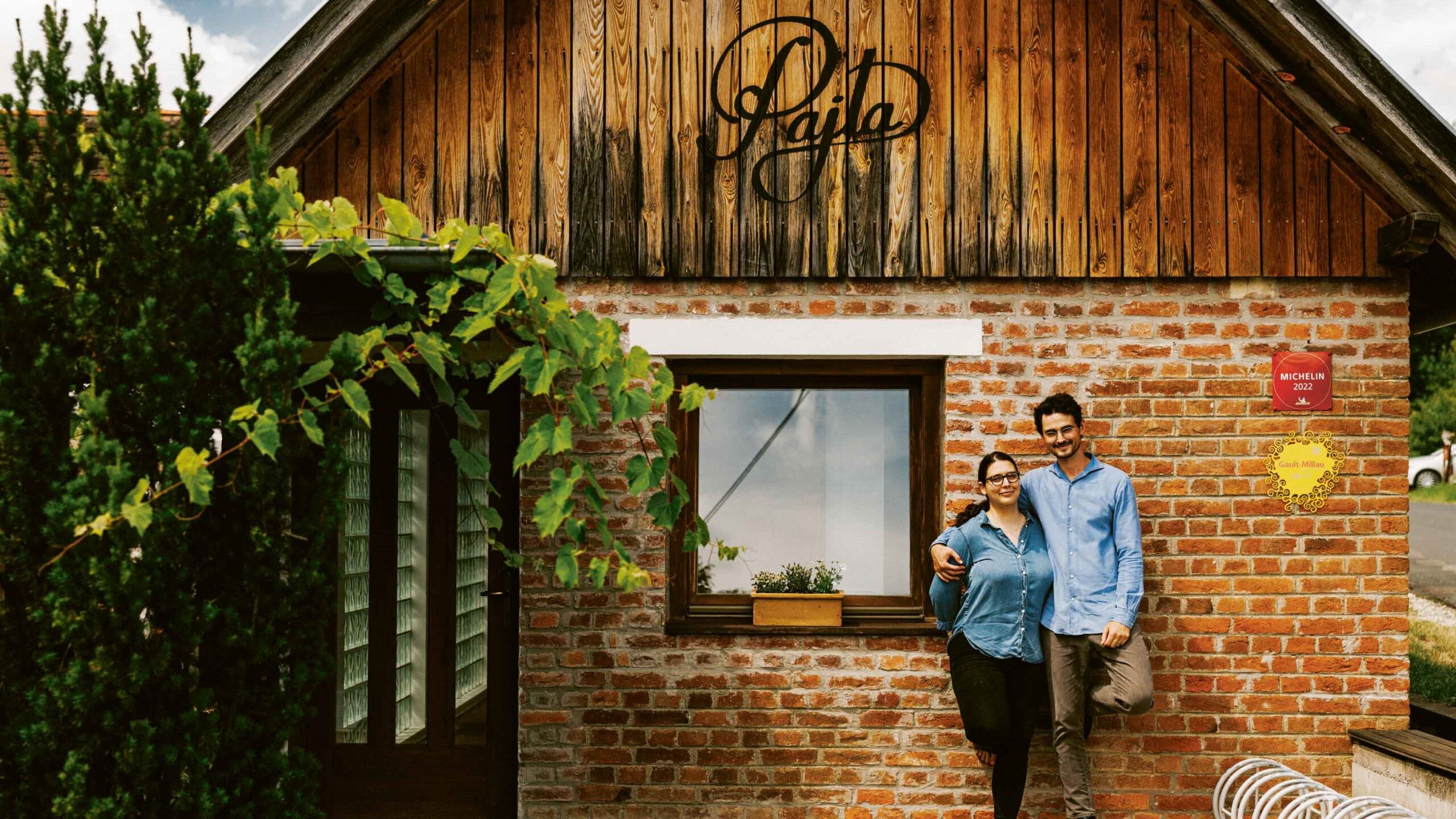The following is a translation of an article written by Zita Meszleny, originally published in Magyar Krónika.
They don’t intend to rethink local food; they simply take advantage of the area’s opportunities. That’s how the results at the Pajta (Barn) Restaurant follow the unique flavours of Őrség without any pretension.
The night before the interview with Magyar Krónika, there was a huge storm, albeit there would be plenty to do on Thursday, the opening day of the restaurant, anyway. Especially now. Flóra Marjai and Ferenc Kvasznicza, owners of the Pajta Restaurant in Őriszentpéter, are sweeping the terrace, cleaning the guest area from the leaves blown in by the wind. Although, one of the charms of the place is that it almost blends in with its surroundings. Despite its national reputation, it’s not pretentious at all. The restaurant’s eponymous old barn building looks just like its counterparts in the area. Thoughtfully added modern glass walls are hidden from the unsuspecting tourists but allow the guests sitting at the table to see the pastures yellowing more slowly than in the rest of the country. As we approach the hustling and bustling couple under the densely overgrown arbour, they stop doing their thing, ask for a minute, and then return apologetically to show us around the place.
‘We are open four days a week. The first day is Thursday when mornings are always busy. We used to start on Wednesdays, but a year and a half ago we shortened the opening hours. The primary reason for this was the impact of the coronavirus epidemic. While the traffic in the country restaurants has increased enormously and the pace has accelerated tremendously, many people have left catering. It’s hard to find reliable workforce,’ Flóra starts as she turns on the coffee machine to ensure that everything is ready to receive the first guests of the day. Asked if they always take on so much of the work, Ferenc replies: ‘We take part in all kinds of work. We drive guests around when needed, and at least one of us almost always takes part in serving up. That way we can connect with the team and the guests and see what’s going on in each process. We believe in our team and in working together for mutual success. That is what we strive to represent. I can think of two days in the last two years when we have not been here. After eleven years we would like to relax a bit, especially since we have had a daughter, which has changed a lot of things, but it is not the time yet.’
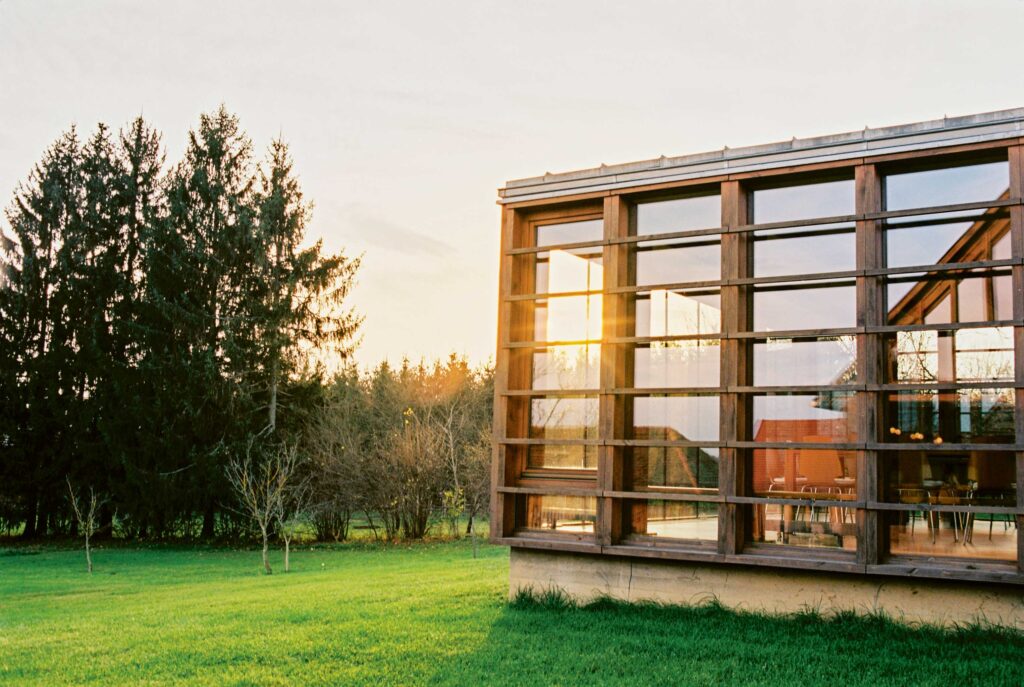
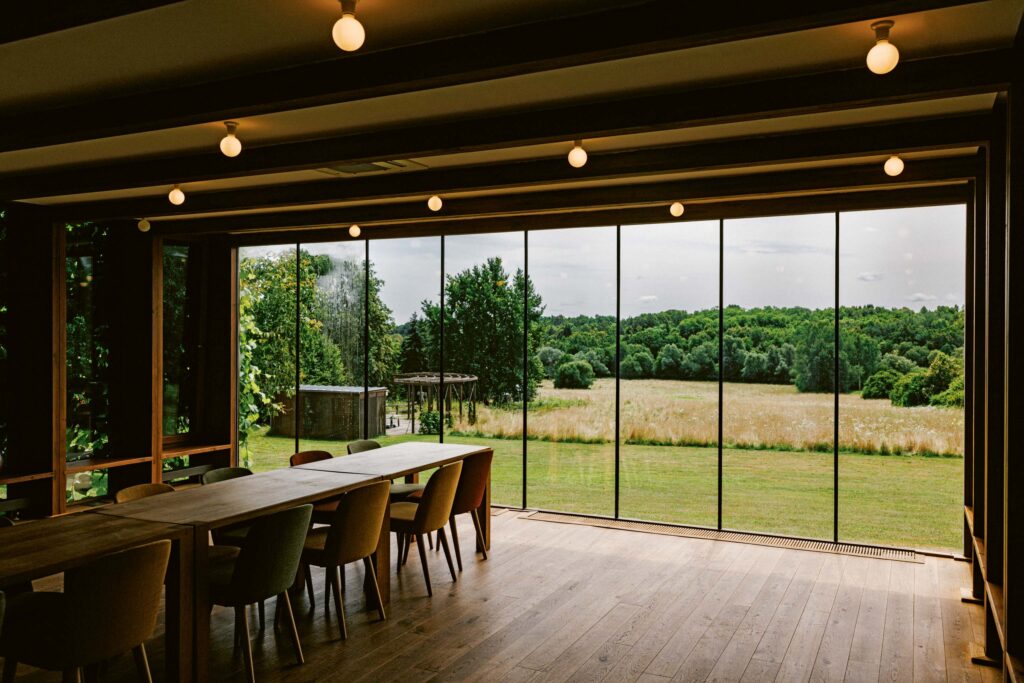
Pajta has been running for eleven years, but the couple has had a longer connection to the region. Although they both lived in the capital, Ferenc’s family once visited Őriszentpéter on their way home from skiing on the recommendation of a friend and started to look at houses until they finally bought one in 2005. The one that now stands right next to the restaurant. ‘My parents were enthusiastic folk dancers, and they imagined what a great folk dance campsite the old barn next to the building would make. However, it quickly became clear that while the idea was nice, it wasn’t sustainable. The folk dancing community is a stable and narrow one, with established venues. Moreover, ten years ago, Őrség was a remote, unknown region. Some backpackers used to come here from spring to autumn, but in winter sometimes no cars were passing our house for days. It was soon realized that it was impossible to build a business in such conditions, relying solely on folk dance camps, let alone organized from Budapest,’ Ferenc recalls.
During the experimental phase, a lavatory for the dancers was built next to the barn, as well as a tiny kitchenette with a few tables. This was just enough for Flóra and Ferenc, who were at university at the time, to try their hand at catering in their spare time during the camps. At first, they served only coffee, then they added a daily cake and later breakfast. Then, during a pumpkin festival in the autumn, they decided to sell bistro-style pumpkin dishes at the event with the help of a chef friend. The idea was a huge success. ‘From then on, we felt that we shouldn’t leave it at that,’ Flóra says, then her husband continues: ‘That was the seed from which it all grew. It evolved naturally, we always took a step forward, which paved the way for something bigger. Then it became so big that it already required the full presence and energy of both of us. That’s when we decided to move here.’ Flóra nods in agreement, then quickly points out: ‘Ours is not a story of being fed up with the city, burnt out on our jobs, and pulling up stakes. We are not newcomers in a rural area. We started our adult lives here because there were opportunities here that we could see ourselves in.’
‘That was the seed from which it all grew. It evolved naturally, we always took a step forward, which paved the way for something bigger’
So, the young couple bravely took the plunge into the unknown, but the arrival was not without challenges. ‘This is a closed world, if only for historical reasons. Even if you come from two villages away, say Pankasz, you are still a stranger, let alone us, from Budapest. It’s hard for people here to let go of that. However, that doesn’t mean that they don’t like newcomers, they just need to be able to handle the situation and not rush things. I already feel at home here. Maybe not in Őrség in general, but here in the restaurant. It’s a separate universe, too,’ Ferenc explains. ‘These are all little hamlets. (Editor’s note: The Hungarian word is a common settlement form in the hilly areas of Central Europe, similar to the hamlets of the UK, which are smaller than a village. Hereafter referred to as ‘hamlets’ for simplicity.) Maybe that’s why it’s hard to connect what are otherwise good and forward-looking initiatives because there is no platform for that. It would be important to have a stage for this because in order for anything to happen, we need meetings, we need to sit around a table,’ Flóra adds.
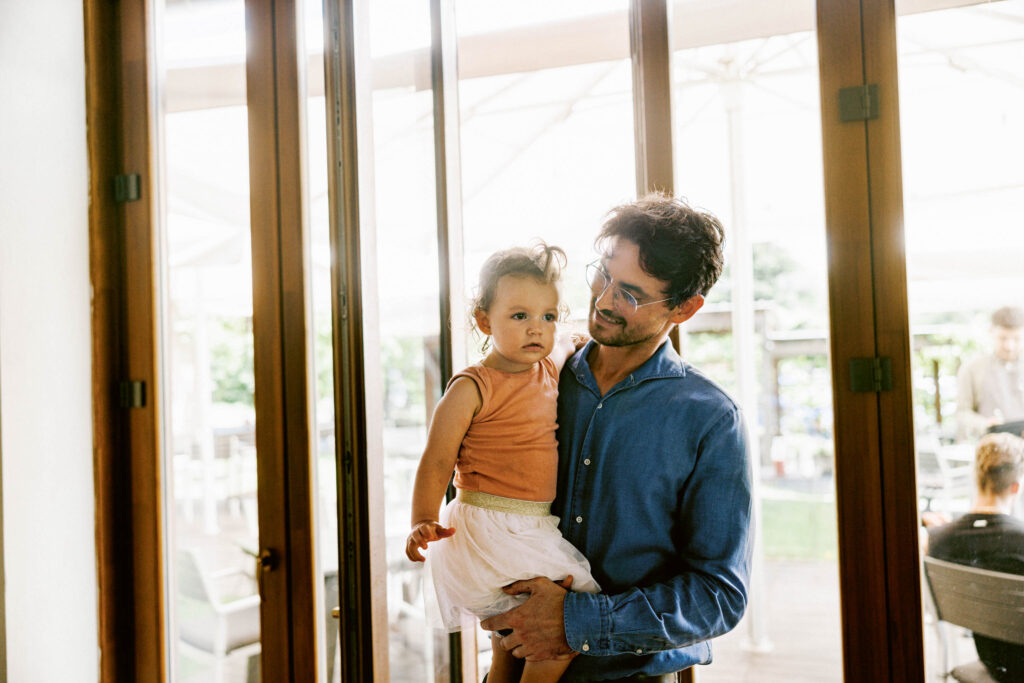
The owners always leave it up to the current chef to decide what goes on the table. ‘If we believe in a competent professional, we express our trust by letting them do their best,’ Flóra points out. This attitude seems to be paying off. The name of Pajta’s previous chef, Richárd Farkas, has become almost synonymous with the place, but István Akács, who has been wearing the same white chef apron since this spring, is sure to convince diners that he is a worthy successor to his renowned predecessor within minutes of their first bite, thanks to his humility and enthusiasm. ‘We’ve never intended to rethink local food, that was never an expectation. The only thing we insist on is a short, seasonal menu with seasonal farmers’ products’, Ferenc continues, adding, ‘We buy what we can from local producers in the area. It’s important to know, introduce, and use the possibilities of the place, to build on them. This way of thinking helps us get to know the area, too, and connect with it and its people.’
The fact that this nice-sounding ambition is a reality here becomes immediately apparent when the conversation is interrupted by a loud honk. Aunt Eszti, the mayor and cheese seller of Nagyrákos, gives an unmistakable signal: she has delivered the daily cargo in her peculiar minibus. Flóra immediately rushes to get the load. She quickly takes it to the kitchen and puts the fresh dairy products next to the berries from the nearby hamlet of Zalalövő, which was brought here by ‘Raspberry Joe’ in the morning, as locals call him. The couple lists what they can get from the area: ‘Pumpkin seeds, pumpkin seed oil, fruit, mushrooms, vegetables, meat, or whatever the team likes at the market in Őriszentpéter.’
The spirit of the place is not just in the food. The tables, which were empty when we arrived, are being covered with tablecloths embroidered by local women during the conversation, the ceramic bowls made especially for the dishes are from Őriszentpéter and Vönck in Vas County, and the building itself is the brainchild of architect Gábor U. Nagy, who lives a few villages away.
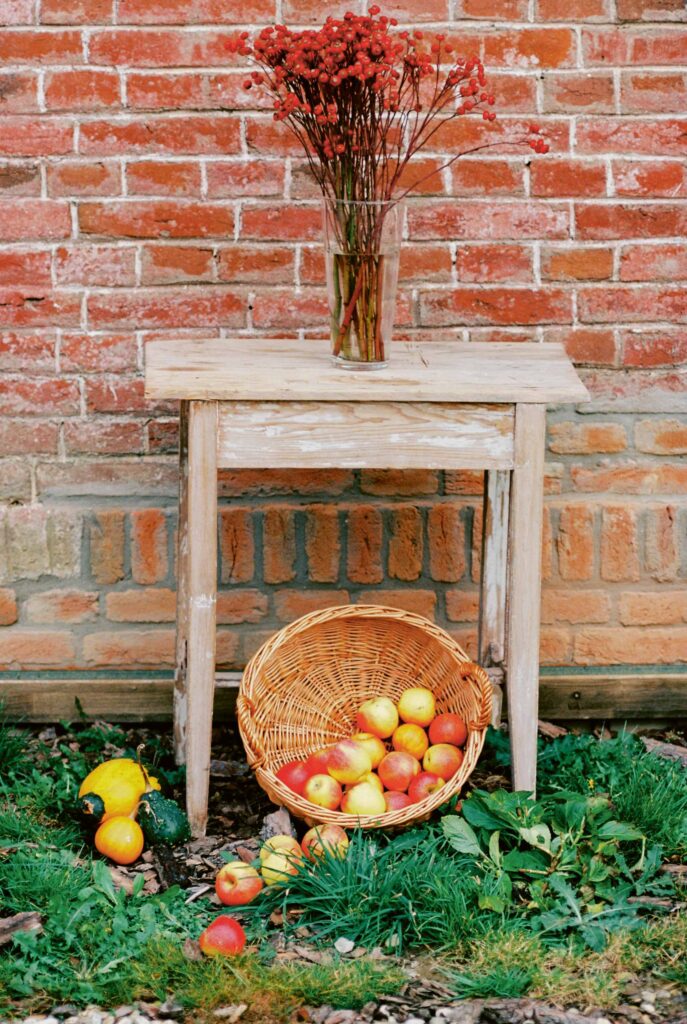
When we ask the owners whether such a restaurant could act as a catalyst in the region, they are cautious with the answer. ‘I don’t think anyone would stay in the area or go into business here just because of us. But if someone has the will and sees that more and more people are looking for quality and appreciate it, they might be more courageous to do what they have been only dreaming of so far,’ Flóra reflects. ‘After the epidemic, many tourists came here, most of them from Budapest, and many stayed. Thus, a more affluent and solvent public has appeared. They and the locals still have to get used to each other a bit, but I am confident that a natural balance will be struck and that everyone will eventually benefit. For example, when the nearby shoe factory, which employed many people, closed and we urgently needed waiters when we opened, we hired seamstresses as waitresses. We were mutually grateful to each other, as we needed each other. We would still be happy to hire a driver, another waitress, and a kitchen assistant, to name just a few examples. And so are the new ones. Opening a place to stay or buying land, let alone keeping livestock, is a lot of work that can be best done by a local, knowledgeable community. This would mean new job opportunities as well if there was an openness to that,’ adds Ferenc.
‘We’ve never intended to rethink local food, that was never an expectation. The only thing we insist on is a short, seasonal menu with seasonal farmers’ products’
The couple brings up the topic of accommodation not by accident. They opened seven cabins in a wooded field of wildflowers this autumn. The aim is to give their business a foothold with less uncertainty, alongside the restaurant. ‘It’s not easy to stick to quality these days. A restaurant like Pajta can only be run with love. It’s not worth it for the profit. If you want to go big, open a small burger buffet. Our restaurant has been only taking the money for five years. That’s not the case today, but we cannot generate amazing extra traffic even if we tear ourselves apart. This kind of catering is not about striking it rich, but it is the kind that you can love. I cannot even imagine doing something we’re not passionate about, so we have to be creative. We think of the restaurant as a brand name that stands for quality, sustainability, and locality. We can use it to build accommodations now, or even a delicatessen later,’ Ferenc says, explaining how they came up with the new direction.
The couple hopes that thanks to the new bungalows, guests will not stress about who is driving if they ask for another glass of wine before hurrying home, whether to the nearest city, Budapest, or across the border; they will rather extend their ‘Pajta experience’ and the visit to Őrség by several days. According to Flóra, ‘the undoubted advantage of Őrség is the triple border and the unique tranquillity that has not yet been lost and that must be taken care of’. ‘I think it is also attractive because it is not near Lake Balaton, but beyond it. You have to go beyond it and take the time and energy to do so. It also filters out visitors, by the way. There’s a sense of inaccessibility here. An inimitable charm of isolation, of integrity,’ her husband reflects.
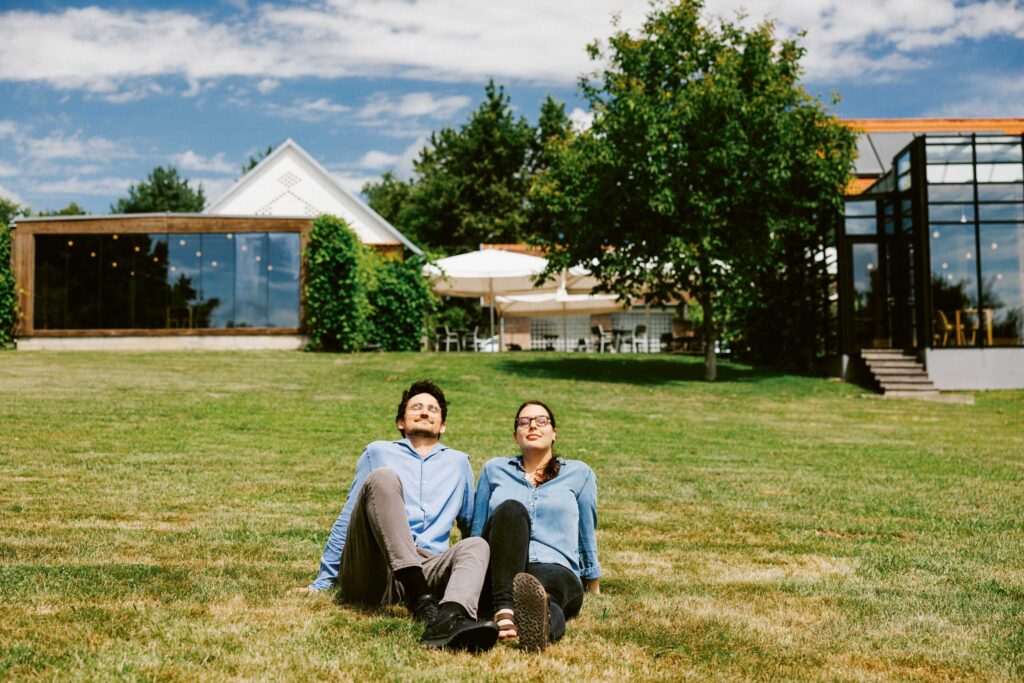
As he speaks, the waiters gather in the middle of the dining area. Within minutes, Pajta will open. The chef is briefing the employees. Flora quickly waves us over, puts on her apron, joins the group, and listens intently to the schedule for the day. We don’t want to hold up the team for the final touches, so we head out with Ferenc. We stop for a moment at the exit. We cannot ignore the Michelin recommendation on the wall and the fact that the owners have just received the special award for best restaurateur from the world’s best-known restaurant guide. ‘It has long been known that Michelin was coming to Hungary, and many restaurants have built themselves up in recent years accordingly. You may know the aspects the jury will assess, but we rather prefer to impress our guests and these two do not always meet. Of course, the stars have a huge marketing power, and we strive to improve day by day, but first of all, we want the common good, not the Michelin star. From the very beginning, we were driven by the desire to do something good. Something good for the guests, for our environment, and for ourselves. There is a Hungarian term that could not be more apt to express this intention: “vendégszeretet”, meaning “loving the guest”, that is, hospitality. We want everyone who comes to us to feel that,’ Ferenc concludes.
The photos in this article are by Árpád Földházi and Gábor Muray.
Related articles:
Click here to read the original article.

